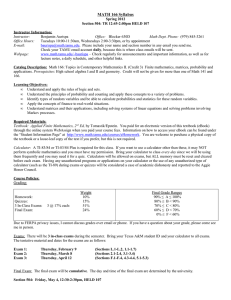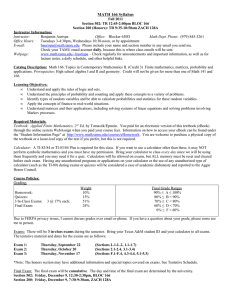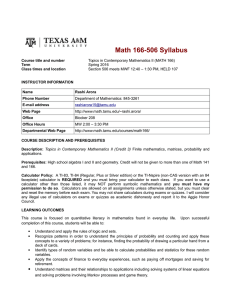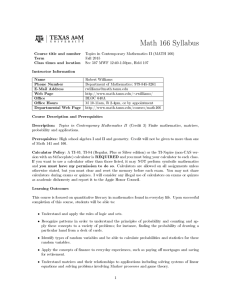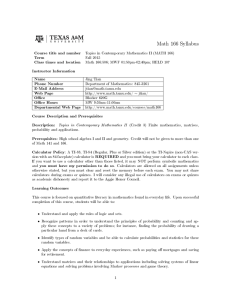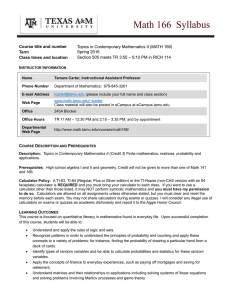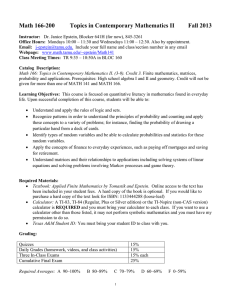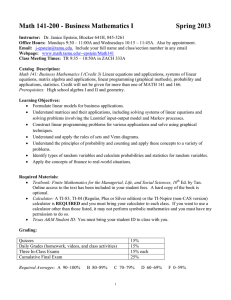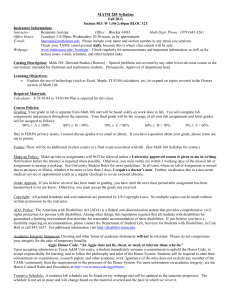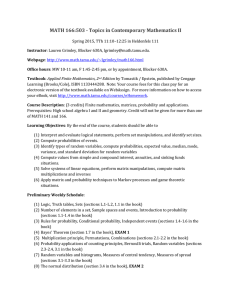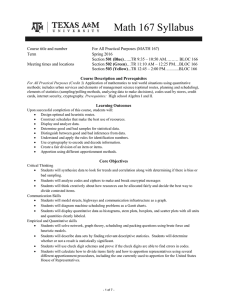Math 166 Syllabus
advertisement
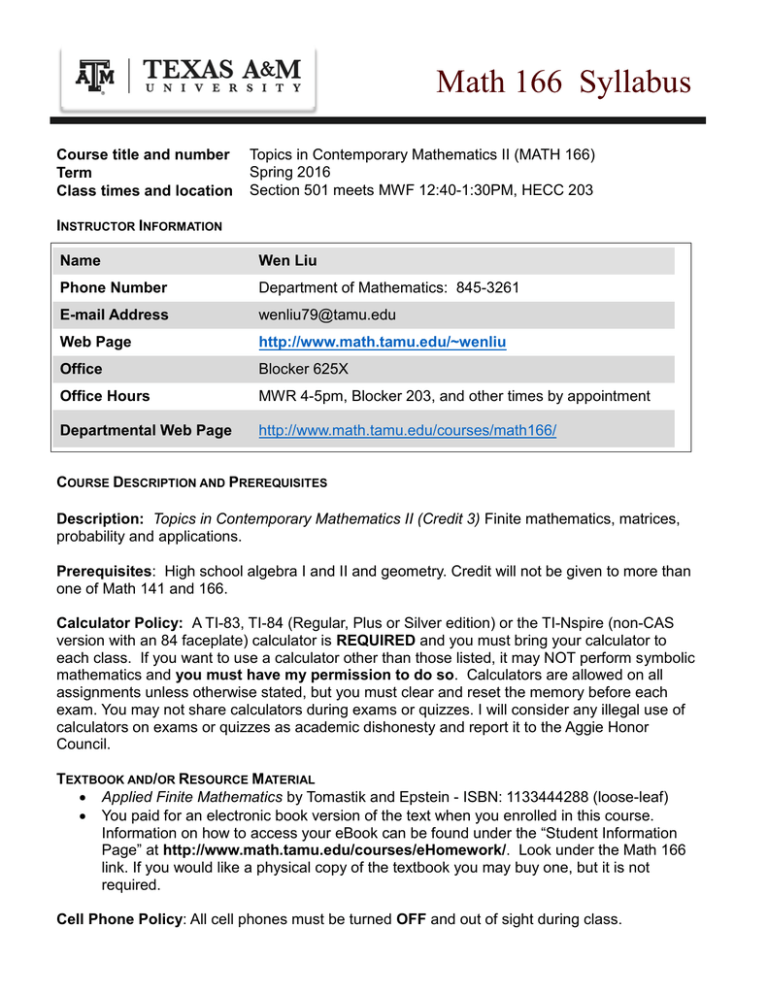
Math 166 Syllabus Course title and number Term Class times and location Topics in Contemporary Mathematics II (MATH 166) Spring 2016 Section 501 meets MWF 12:40-1:30PM, HECC 203 INSTRUCTOR INFORMATION Name Wen Liu Phone Number Department of Mathematics: 845-3261 E-mail Address wenliu79@tamu.edu Web Page http://www.math.tamu.edu/~wenliu Office Blocker 625X Office Hours MWR 4-5pm, Blocker 203, and other times by appointment Departmental Web Page http://www.math.tamu.edu/courses/math166/ COURSE DESCRIPTION AND PREREQUISITES Description: Topics in Contemporary Mathematics II (Credit 3) Finite mathematics, matrices, probability and applications. Prerequisites: High school algebra I and II and geometry. Credit will not be given to more than one of Math 141 and 166. Calculator Policy: A TI-83, TI-84 (Regular, Plus or Silver edition) or the TI-Nspire (non-CAS version with an 84 faceplate) calculator is REQUIRED and you must bring your calculator to each class. If you want to use a calculator other than those listed, it may NOT perform symbolic mathematics and you must have my permission to do so. Calculators are allowed on all assignments unless otherwise stated, but you must clear and reset the memory before each exam. You may not share calculators during exams or quizzes. I will consider any illegal use of calculators on exams or quizzes as academic dishonesty and report it to the Aggie Honor Council. TEXTBOOK AND/OR RESOURCE MATERIAL Applied Finite Mathematics by Tomastik and Epstein - ISBN: 1133444288 (loose-leaf) You paid for an electronic book version of the text when you enrolled in this course. Information on how to access your eBook can be found under the “Student Information Page” at http://www.math.tamu.edu/courses/eHomework/. Look under the Math 166 link. If you would like a physical copy of the textbook you may buy one, but it is not required. Cell Phone Policy: All cell phones must be turned OFF and out of sight during class. Email Policy: Check your official TAMU email account EVERY day. You are responsible for any information I send via email. Also, because of privacy rights, I cannot discuss grades via email. Note: Due to the large volume of students, there is no guarantee you will receive a same day reply to an email. Start your studying and/or homework in plenty of time so you can stop by my office hours or a Math 166 Help Session to be sure your questions are answered. Also, please use “Math 166 Your initials” as the subject. If any of this information is missing, it will delay my response. LEARNING OUTCOMES This course is focused on quantitative literacy in mathematics found in everyday life. Upon successful completion of this course, students will be able to: Understand and apply the rules of logic and sets. Recognize patterns in order to understand the principles of probability and counting and apply these concepts to a variety of problems; for instance, finding the probability of drawing a particular hand from a deck of cards. Identify types of random variables and be able to calculate probabilities and statistics for these random variables. Apply the concepts of finance to everyday experiences, such as paying off mortgages and saving for retirement. Understand matrices and their relationships to applications including solving systems of linear equations and solving problems involving Markov processes and game theory. GRADING POLICIES The course grading will be based on the results of the following: WebAssign Homework: o Online homework will be posted on WebAssign along with the due date. The WebAssign Login Page is: www.math.tamu.edu/courses/eHomework/ o You have a “practice” version and a “homework” version for each assignment. You have 20 attempts for each question in the practice version, and you have 3 attempts for each question in the homework version (you can submit the answer(s) to each question individually). The practice versions are NOT counted toward your grade. o After submitting an answer in the practice version, you will see the correct answer. It is very important that you work the practice version at least once so you will see the format you need to use for your answers in WebAssign. o If you ever have technical issues with WebAssign, please fill out the “Student Help Request Form” found at http://www.math.tamu.edu/courses/eHomework/. o Late work (for which you do not have a University approved excused absence) will NOT be accepted. I will NOT give an extension due to technical difficulties, so be sure to start your homework well in advance so that you have time to resolve any technical issues. Quizzes: Quizzes will be given every Monday. If you have your cell phone out, you will receive a zero. You will be expected to take off your hat and show ALL of your work NEATLY on all problems for full credit. If you miss a quiz, you must have written proof of a University approved excused absence AND contact me within 24 hours missing a quiz to schedule a make-up quiz (see University Student Rules). Exams: There will be three in-class exams. You will be expected to take off your hat and show all of your work, including calculator methods, on all problems for full credit, unless it is stated otherwise. You MUST bring your student ID or driver’s license to the exams. After entering the classroom on exam days, you will NOT be allowed to leave until you turn your exam in. Final Exam: The in-class final exam is COMPREHENSIVE. Grade Breakdown Activity Homework Quizzes Exam I Exam II Exam III Final Exam Total Grading Scale Range 90% ≤ average ≤ 100% 80% ≤ average < 90% 70% ≤ average < 80% 60% ≤ average < 70% 0% ≤ average < 60% Date Weekly Weekly 02/12 03/11 04/15 05/06, 10:30am-12:30pm Percentage 10% 10% 19% 19% 19% 23% 100% Grade A B C D F Grade Disputes: If you disagree with any deduction taken on an assignment or exam handed back in class, you must bring it to my attention BEFORE leaving class the day the assignment is returned. Due to privacy issues, I cannot discuss grades over email or phone. If you have a question about your grade, please come see me in person. Copyright Policy: All notes, exams, printed handouts and/or assignments, and web-materials are protected by U.S. Copyright Laws. No multiple copies can be made without my written permission. No exams or assignments may be shared with anyone outside of the class or posted on any website. ATTENDANCE AND MAKE-UP POLICIES Excused absences: Attendance is essential and may affect your grade. For excused absences please refer to Student Rule 7 at http://student-rules.tamu.edu/rule07. Excuses for absences must be substantiated by appropriate documentation. Falsification of documentation is a violation of the Honor Code. Notification before the absence is required when possible. Otherwise, you must notify me within 24 hours of the missed exam, quiz, or assignment to arrange a makeup. Further, an absence due to a non-acute medical service or appointment (such as a regular checkup) is NOT an excused absence. Where you sit on 01/25 is your seat for the rest of the semester, except for exam days. Make-up exams will be only allowed due to excused absences and the next possible make-up time be chosen from http://www.math.tamu.edu/courses/makeupexams.html You must contact me in advance or within 24 hours of missing an exam in order to schedule your make-up exam. COURSE TOPICS (Tentative weekly schedule. All changes will be announced in class.) WEEK TOPIC SECTIONS COVERED 1 Logic, truth tables, sets Sections L.1–L.2, 1.1 Number of elements in a set, sample spaces and events, 2 Sections 1.1–1.4 basics of probability Rules for probability, conditional probability, independent 3 Sections 1.4–1.6 events Bayes' Theorem. Review. Exam 1 (L.1–L.2, 1.1–1.7) 4 Section 1.7 5 6 7 8 10 11 12 13 14 15/16 Multiplication principle, permutations, combinations Probability applications of counting principles, Bernoulli trials, random variables Random variables and histograms, measures of central tendency, measures of spread The normal distribution, Review. Exam 2 (2.1–2.4, 3.1– 3.4) Simple and compound interest, annuities, sinking funds Amortizations, introduction to systems, writing systems of linear equations, solving systems of linear equations with unique and non-unique solutions Systems of linear equations with non-unique solutions, matrices, matrix multiplication with applications Sections 2.1–2.2 Sections 2.3–2.4, 3.1 Sections 3.1–3.3 Section 3.4 Sections F.1–F.3 Sections F.4, 4.3–4.4 Sections 4.4, 5.1–5.2 Inverse matrices, Review, Exam 3 (F.1–F.4, 4.3–4.4, 5.1– Section 5.3 5.3) Markov processes, regular Markov processes, Absorbing Sections M.1–M.3 Markov processes Finish Chapter M Game theory, Review for Final Exam Sections G.1–G.2 AMERICANS WITH DISABILITIES ACT (ADA) The Americans with Disabilities Act (ADA) is a federal anti-discrimination statute that provides comprehensive civil rights protection for persons with disabilities. Among other things, this legislation requires that all students with disabilities be guaranteed a learning environment that provides for reasonable accommodation of their disabilities. If you believe you have a disability requiring an accommodation, please contact Disability Services, currently located in the Disability Services building at the Student Services at White Creek complex on west campus or call 979-845-1637. For additional information, visit http://disability.tamu.edu. ACADEMIC INTEGRITY “An Aggie does not lie, cheat, or steal, or tolerate those who do.” Upon accepting admission to Texas A&M University, a student immediately assumes a commitment to uphold the Honor Code, to accept responsibility for learning, and to follow the philosophy and rules of the Honor System. Students will be required to state their commitment on examinations, research papers, and other academic work. Ignorance of the rules does not exclude any member of the TAMU community from the requirements or the processes of the Honor System. For additional information on the Honor Council Rules and Procedures, consult http://aggiehonor.tamu.edu. Courtesy & Respect: Please respect other students’ time (and also yours). That means you should ALWAYS silence your phone before the class starts and you should NOT have conversations in class. If I feel you are being disruptive or disrespectful during class, you may be asked to leave the room. ADDITIONAL SOURCES OF HELP Office hours: I offer 3 hours of office hours per week. You are encouraged to ask me questions in class, come to my office hours, and talk with me. Week-in-Review (WIR): There are Week-in-Review sessions conducted by an instructor each week. Each review is open to all Math 166 students to review the topics of the previous week and to provide additional examples. The days, times and places of these reviews will be posted and will be announced in class, once they are determined. This information can be found at http://www.math.tamu.edu/courses/weekinreview.html. Help Sessions: Help sessions are an opportunity for you to ask questions and get help with your homework. These sessions are led by students, where you may come and go, as your schedule allows. Once determined, the schedule will be announced in class, and additionally posted at http://www.math.tamu.edu/courses/helpsessions.html.
